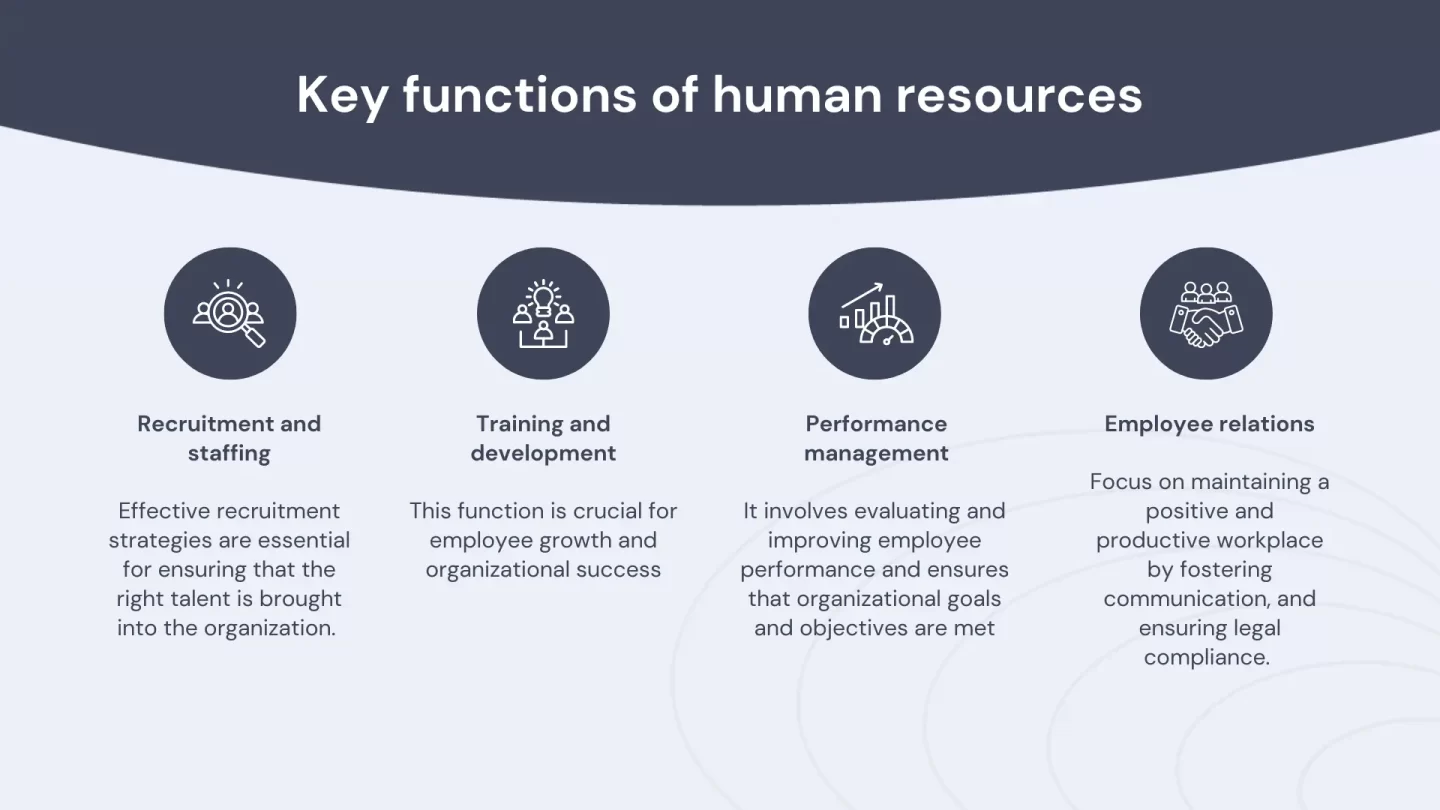Human resources (HR) play a critical role in any organization. It encompasses a wide range of functions that contribute to the efficient management and growth of a company’s workforce. From recruitment and training to employee relations and benefits management, HR is integral to fostering a productive and compliant work environment.

Understanding Human Resources
Human resources are the department within an organization responsible for managing employee-related functions. This includes hiring, training, employee benefits, compliance with labor laws, and ensuring workplace safety.
Historical Background of Human Resources
The concept of human resources has evolved significantly over the decades. Initially focused on administrative tasks, HR has transformed into a strategic partner in business operations, emphasizing employee engagement, culture, and organizational development.
Key Functions of Human Resources

1. Recruitment and Staffing
Recruitment is a fundamental HR function that involves attracting, screening, and selecting qualified individuals for job openings. Effective recruitment strategies are essential for ensuring that the right talent is brought into the organization.
WTS Energy offers comprehensive recruitment services tailored to the energy sector. Our expertise ensures you find the perfect fit for your company’s needs.
Strategies for Effective Recruitment
- Employer Branding: Developing a strong employer brand to attract top talent.
- Job Descriptions: Crafting clear and concise job descriptions to outline role expectations.
- Candidate Sourcing: Utilizing multiple channels such as job boards, social media, and employee referrals to find candidates.
2. Training and Development
Training and development focus on improving the skills and knowledge of employees. This function is crucial for employee growth and organizational success. WTS Energy offers customized training programs to enhance your workforce’s capabilities.
Methods of Training
- On-the-Job Training: Hands-on experience in the workplace.
- Workshops and Seminars: Structured learning sessions.
- E-Learning: Online courses and modules.
3. Performance Management
Performance management within human resources involves evaluating and improving employee performance. This function ensures that employees meet organizational goals and objectives.
Performance Appraisal Systems
- 360-Degree Feedback: Comprehensive feedback from peers, supervisors, and subordinates.
- Self-Assessment: Employees evaluate their performance.
- Key Performance Indicators (KPIs): Metrics to measure performance.
4. Employee Relations
Employee relations is an important area of Human Resources. It focuses on maintaining a positive and productive work environment. This involves addressing employee grievances, fostering communication, and ensuring legal compliance.
Conflict Resolution Strategies
- Mediation: Facilitated negotiations to resolve disputes.
- Arbitration: Binding decisions by an impartial third party.
- Open Door Policy: Encouraging employees to voice concerns.
Looking for top-tier talent in the energy sector? Contact WTS Energy for specialized recruitment solutions tailored to your business needs.
Compensation and Benefits
Compensation and benefits are critical for attracting and retaining employees. This function involves developing competitive salary structures and benefits packages.
Types of Employee Benefits
- Health Insurance: Medical, dental, and vision coverage.
- Retirement Plans: 401(k) and pension plans.
- Paid Time Off: Vacation, sick leave, and holidays.
Ensure competitive compensation and benefits with WTS Energy’s payroll and benefits management services. Reach out to us today.
Strategic Human Resources Management
Strategic HR management involves aligning HR functions with the overall business strategy. This ensures that HR contributes to achieving organizational objectives.
Key Elements of Strategic HR
- Workforce Planning: Anticipating future HR needs.
- Talent Management: Identifying and developing future leaders.
- Change Management: Managing organizational change effectively.
Align your HR strategies with business goals through WTS Energy’s expert consulting services. Learn more now.
Current Trends in Human Resources
1. Digital Transformation in HR
The digital age has transformed HR practices. Technology plays a crucial role in automating HR functions and improving efficiency.
HR Technology Solutions
- HR Information Systems (HRIS): Integrated software for managing HR processes.
- Applicant Tracking Systems (ATS): Tools for streamlining recruitment.
- Performance Management Software: Platforms for tracking and evaluating performance.
2. Employee Engagement and Wellbeing
Employee engagement and wellbeing are now top priorities for HR. Ensuring that employees are motivated and healthy is key to productivity and retention.
Strategies for Enhancing Engagement
- Recognition Programs: Acknowledging employee achievements.
- Wellness Programs: Initiatives to promote physical and mental health.
- Flexible Work Arrangements: Offering remote work and flexible hours.
Boost employee engagement and wellbeing with WTS Energy’s comprehensive HR services. Reach out for more details.
Conclusion
Human resources are vital to the success of any organization. By effectively managing recruitment, training, performance, employee relations, and compensation, HR professionals can foster a positive work environment and drive organizational growth. Staying updated with current trends and aligning HR strategies with business goals are essential for maximizing the impact of HR functions.
Sources:
https://www.umassglobal.edu/news-and-events/blog/key-functions-of-human-resources
https://open.lib.umn.edu/humanresourcemanagement/chapter/1-1-what-is-human-resources/






